- Homepage
- Honey Mead
- Introduction to Brewing Mead
Introduction to brewing mead
This introduction to brewing mead was given at the Honey Festival in Pietermaritzburg in 2023; it's an apperitif for every home.
The taste of mead is as old as that of icy-cold spring water; it predates wine and beer by millennia. It's a brew made from just four ingredients.
- Honey
- Unchlorinated water
- Yeast
- Pollen
To which many meaders are now adding various fruits and spices; alcohol can be a preservative as well as a tipple. Today we are going to make a peppadew melomel. It's not difficult.
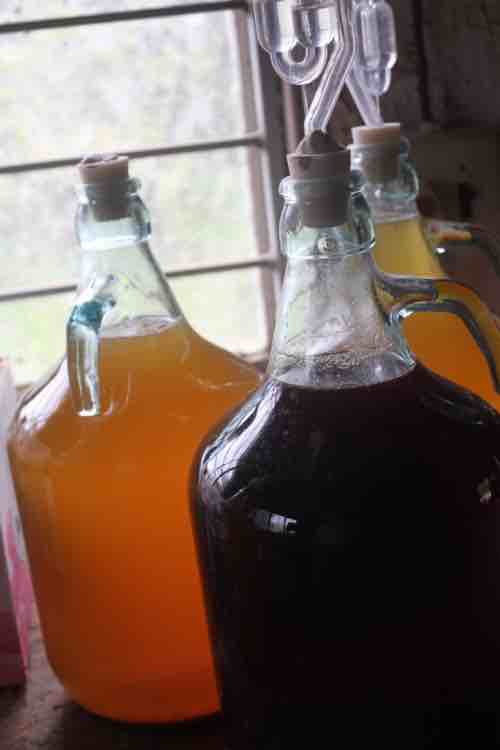
Alcohol
Alcohol for many good reasons gets a lot of bad press, most noteworthy of which is that even two drinks per week increases the rate of breast cancer[2].
However all that research has been done on alcohol that has been distilled or pasteurised. The assumption that researchers have made is that natural wines and beers are virtually unobtainable; and can thus be ignored.
It's not an unreasonable assumption; but your own home-brewed mead is different. It is unpasteurised and no preservatives are added; it makes an excellent probiotic. In what I call the happy tum there are an incredible 2kg of friendly bugs; bacteria, viruses and yeast cells. They have a profoundly important influence on our overall health; but most folk are seriously lacking.
In four of the five Blue Zone countries where people live such long and zestful lives, many folk drink 2 or 3 glasses of local, natural wines and ales daily; with a very low incidence of cancer.
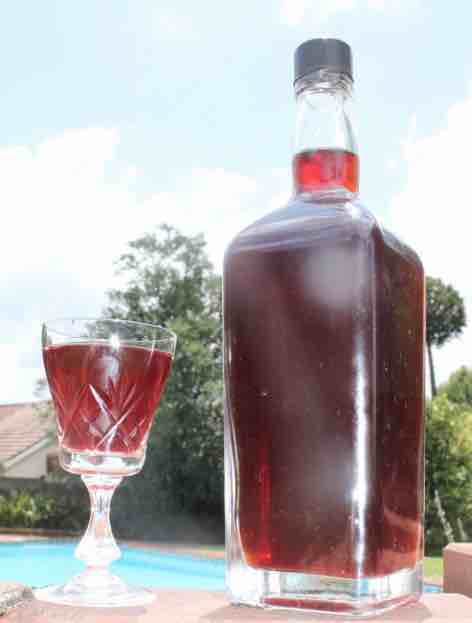 Mulberry mead
Mulberry meadYour own medicine
So think of brewing your own mead as medicine; as a big plus for wellness like baking bread, growing vegetables and cooking from scratch.
It does take time but as I often say, I would rather spend hours labouring over good, healthy food and drink than sitting in the doctor's consulting room.
"Let thy food be thy medicine, and medicine be thy food."
Hippocrates (460 - 370 BC)
Basic equipment
Only three utensils are really needed to brew your own mead. A carboy, several demijohns and an automatic syphon; costing under R1,000. That's about 50 US dollars. You will of course once you get into this want more items like a hydrometer and litmus paper; but really, they are not essential for the beginner.
R1,000 and you are in business. The rest of the bits and pieces you'll find around every home; like a funnel and smooth pebbles from a berg stream. Glass marbles can be used too for weights.
This introduction to brewing mead is to make it plain how simple it is; the only difficulty is getting good quality honey. Of course the finer details take years to master. Let's get started.
8 liter carboy
The 8L carboy is a good place to start; they are quite hard to get by the way since the courier companies will not guarantee them but that's another story.
You will need 2.6kg of unheated honey, 8 peppadews and an orange.
First wash out your carboy carefully with Sunlight liquid and rinse thoroughly.
Place the carboy on your kitchen scale and pour in the honey. We like to add a cup of strong black tea that acts as an astringent.
Now add 5L of unchlorinated water and slosh it about for ten minutes to aerate the mixture[3]; it gets the yeast off to a good start.
De-seed your peppadews, harvest some zest from the orange and then peel it; discard the pith. Put them in a little bag with a pebble or marbles to weigh them down. Gently put it into the carboy so that it doesn't drop like a stone and smash the glass.
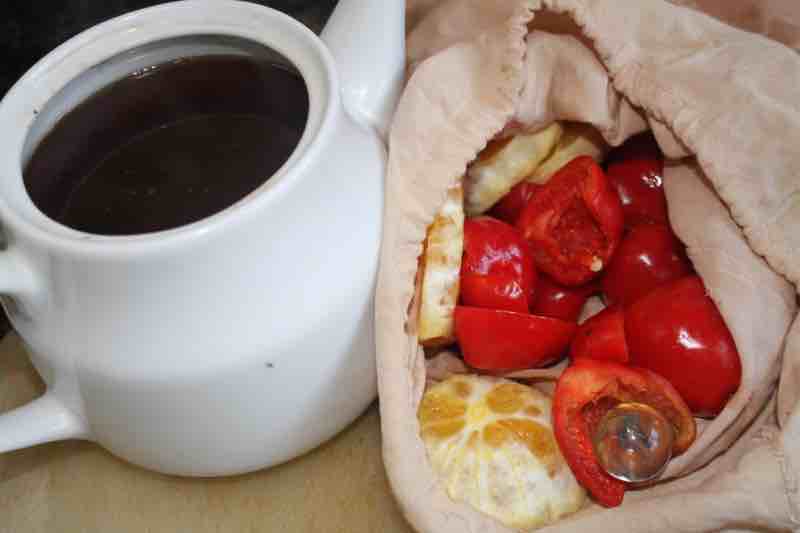
We are nearly done. Add 1/3 tsp of wine yeast to half a cup of warm unchlorinated water and leave it to hydrate for 20 minutes. Pour it into the must in the carboy. Screw on the lid tightly and fit the bubbler.
Bob's your uncle, you are done. Fermentation will begin within 24 hours.
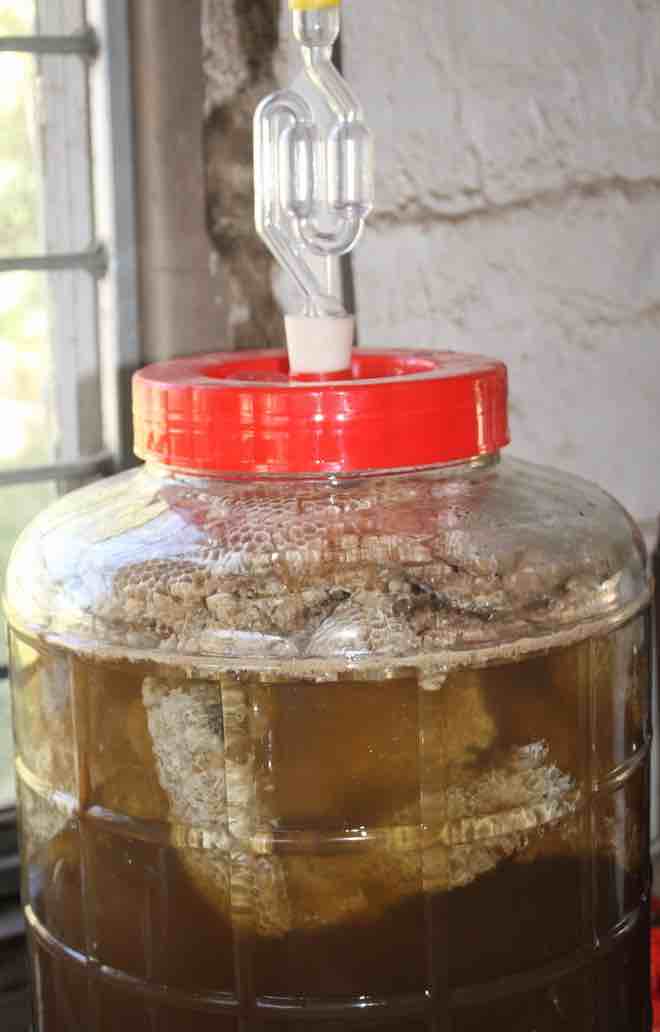
Nutrients for the yeast
Just as we cannot live on carbs alone, so the yeast needs something more than pure nectar to flourish; I have simply used completely unprocessed honey that is rich in pollen. I will probably add a small piece of old comb as well.
Wait until the temperature is below 30oC before adding the yeast; some say below 20oC. Aerate the must first.
Sometimes one may have added water at 40o to dissolve the honey more quickly; that would kill any yeast present and you must not then aerate the must. You might get vinegar.
Temperature
Try to get the initial temperature of the must around 20oC; above 22 degrees some beer sites report that unpleasant tasting esters are formed. That is probably true of brewing mead too. Choose a cool day.
Below 12oC and the fermentation may stop. There's an art to brewing mead; in the initial stages it is a good idea to stick with the tried and tested.
Racking off the raw mead
Now comes the tedious part; waiting. Bubbling can continue for months but it usually comes almost to an end within a month or so. There's no rush but when you have a free hour, then syphon off the liquid into carboys. Discard the peppadews and orange. Leave the airlock on or it may explode.
Again you have to play the waiting game; put your demijohns of mead into a cool dark place for several months; until it starts to clear. Then again syphon off the must into another clean and sterilized carboy. You really should wait for a year but of course not many of us have the patience for that.
Ullage
The gap between the top of the mead and the bung should ideally be about 25mm; it's known as the ullage. If it is too great the mead may spoil from oxidation by the air. Less than an inch is also problematic say the experts.
Good honey
Those of you who are serious about good food and drink will know that you can't make a decent salad with lettuce that was picked a week ago. You have to grow it yourself.
You can't bake a nutritious loaf of bread with refined flour.
And you can't make a decent mead with crappy supermarket honey. Unashamedly we are encouraging you to start beekeeping.
Interestingly beekeepers live long in the land unless they have some bad habits; or they let their mead become master of the house. It makes a very good servant but a rotten boss.
In 23 litres use 8kg of honey for a sweet mead.
6.9kg for a semi-dry.
That is roughly 1tsp of honey less per glass of 125ml; about 6g.
Gleanings
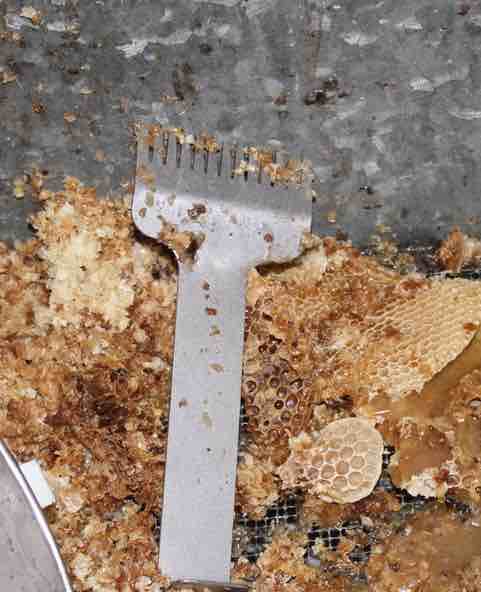
Beekeepers use the gleanings after they have harvested for their mead. I'm sure you know that a comb is really just a ton of tiny bottles each sealed with a wax lid. To extract the honey you first have to remove those "cappings' with a scraper; a fork, roller or hot knife.
Quite a lot of top-quality honey is lost, so you can simply add warm water to it; and use a potato masher to dissolve it. Previously we just gave those cappings back to the bees but it's actually not a good idea for several reasons. Instead start brewing mead.
"A natural wine has nothing added, nor anything removed."
- Alice Feiring, author of Naked Wine.
Ph
Yeast has an ideal pH range from about pH 3.8 to pH 4.5.
Add 1.25ml of sodium bicarbonate per 0.5 adjustment on 5 litres.
To raise the pH from 2.0 to 3.5 one would need 3 x 1.25ml = 3.75; about half a teaspoon.
The material expressed on this page is gleaned from the nutritional and environmental literature; it is clearly referenced. A plain distinction is made between the author's opinion and that which is scientifically proven. When in doubt consult your health professional.
To suggest a correction or clarification, write to Dr Bernard Preston here. Contact.
T'ej
Brewing really is a journey. You begin with what we call an all-hive mead; just honey, an old comb and water; then you start to add fruit to make a melomel.
And then it is on to a braggart, a beer made with honey; and t'ej, an apparently wonderful drink made by the Ethiopians. That is my next project; I have just planted an African Dogwood tree. The twigs are used to make it bitter, not unlike hops is used in a common ale.
Introduction to brewing mead
At this introduction to brewing mead I have only one negative to report; and actually it is a positive. It's only for beekeepers and the very wealthy. 2.6kg of decent honey like this, about five bottles, will cost you around R500.
We should all be considering keeping a hive or two in the garden; for the planet, for good honey and for brewing mead. Join the association, we'll teach you how to do it and I can promise you this is the hobby of a lifetime. You will be healthier, live longer and perhaps even join the ranks of legendary beekeepers who have a real sparkle well into their eighties, nineties and even more.
And be able to enjoy an glass or two of a wonderful mead with your dinner, without guilt; it will add to your years, not detract as the commercial drinks will do.
Fatty Pancreas
Fatty Pancreas is a serious condition in which lipid droplets infiltrate and replace the functional cells in the organ. Nearly one fifth enjoying typical supermarket food suffer from it.
Whilst sugar, refined carbs and seed oils are the chief villains of the peace, alcohol needs to be brought into the overall picture too; it is turned into triglycerides by the liver.
When browsing use right click and "Open Link in New Tab" or you may get a bad gateway signal.
Newsletter
Our newsletter is entitled "create a cyan zone" at your home, preserving both yourself and Mother Earth for future generations; and the family too, of course. We promise not to spam you with daily emails promoting various products. You may get an occasional nudge to buy one of my books.
Here are the back issues.
- Lifestyle and ideal body weight
- What are ultra-processed foods?
- Investing in long-term health
- Diseases from plastic exposure
- Intensive lifestyle management for obesity has limited value
- A world largely devoid of Parkinson's Disease
- The impact of friendly bacteria in the tum on the prevention of cancer
- There's a hole in the bucket
- Everyone is talking about weight loss drugs
- Pull the sweet tooth
- If you suffer from heartburn plant a susu
- Refined maize meal and stunting
- Should agriculture and industry get priority for water and electricity?
- Nature is calling
- Mill your own flour
- Bake your own sourdough bread
- Microplastics from our water
- Alternative types of water storage
- Wear your clothes out
- Comfort foods
- Create a bee-friendly environment
- Go to bed slightly hungry
- Keep bees
- Blue zone folk are religious
- Reduce plastic waste
- Family is important
- What can go in compost?
- Grow broad beans for longevity
- Harvest and store sunshine
- Blue zone exercise
- Harvest and store your rainwater
- Create a cyan zone at your home
Did you find this page interesting? How about forwarding it to a friendly book or food junkie? Better still, a social media tick would help.
- Homepage
- Honey Mead
- Introduction to Brewing Mead
Address:
56 Groenekloof Rd,
Hilton, KZN
South Africa
Website:
https://www.bernard-preston.com